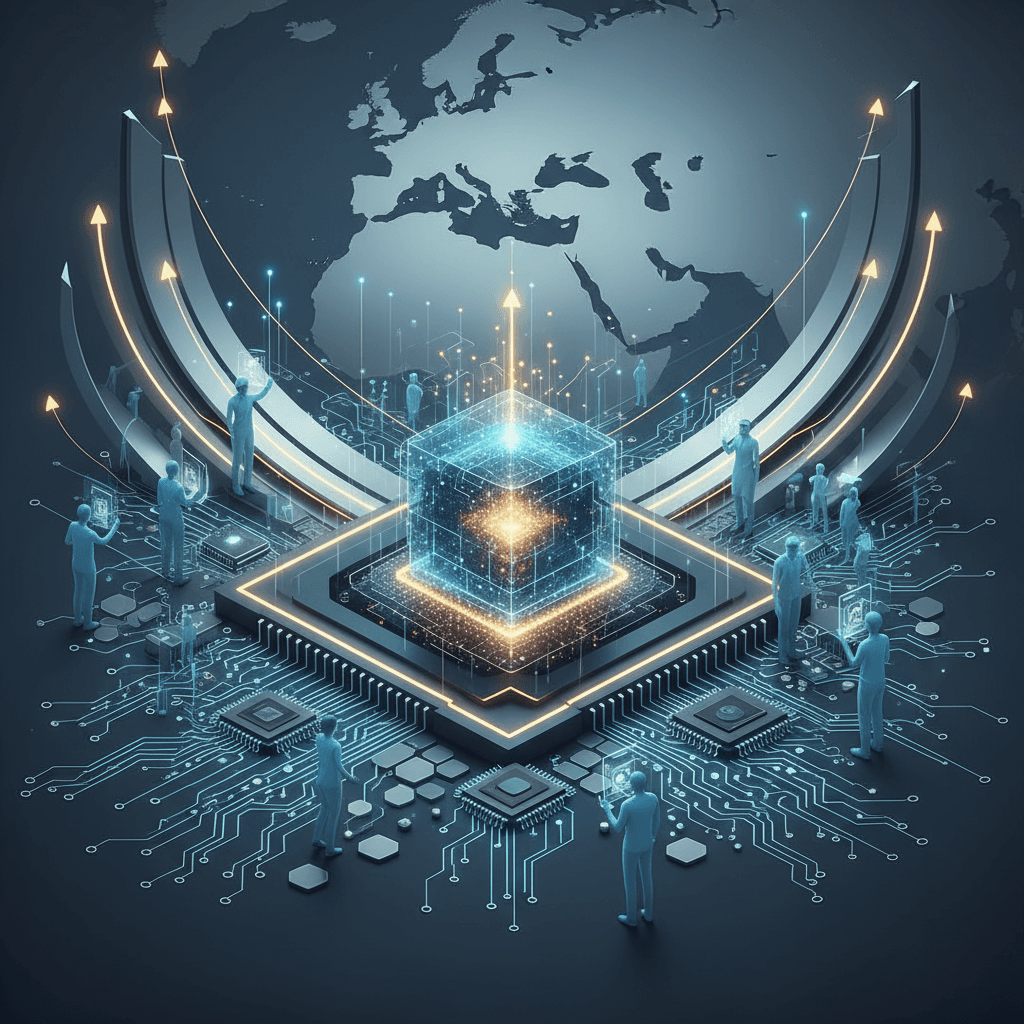Microsoft commits $15.2 billion to transform UAE into global AI powerhouse.
Microsoft's $15.2B investment transforms the UAE into an AI super-node, driven by secure infrastructure, talent, and US strategic alignment.
November 4, 2025

Microsoft is undertaking a monumental $15.2 billion investment in the United Arab Emirates through 2029, a strategic push designed to cement the Gulf nation as a global powerhouse in artificial intelligence.[1][2][3][4] The comprehensive plan focuses on deploying advanced AI and cloud infrastructure, fostering local digital talent, and deepening the technological cooperation between the UAE and the United States.[5][4] This initiative not only represents one of Microsoft's most significant global expansions outside the United States but also aligns with the UAE's ambitious national strategy to become a world leader in AI by 2031.[6][7][3][8] The investment underscores a global race for technological supremacy, with the UAE emerging as a pivotal hub for innovation and development in the Middle East.[1][9] Microsoft's commitment is a clear indicator of the growing importance of sovereign AI capabilities and the strategic partnerships being forged to build them.
The financial architecture of this investment is substantial and multifaceted, with funds allocated to cutting-edge hardware, infrastructure, and operational growth. The total $15.2 billion commitment is being deployed in two main phases.[10] From 2023 through the end of 2025, Microsoft will have invested and spent over $7.3 billion.[11][5][10][4] This initial phase includes a significant $1.5 billion equity investment in G42, the UAE's leading AI technology holding company, as well as over $4.6 billion in capital expenses for state-of-the-art AI and cloud datacenters, and more than $1.2 billion in local operating expenses.[11][5][10] Looking forward, an additional $7.9 billion is earmarked for the period between 2026 and 2029.[1][12][13][14][15][16][17] This second phase will see over $5.5 billion dedicated to the continued expansion of AI and cloud infrastructure and nearly $2.4 billion for ongoing local operations.[10][14][15][4] A critical component of this infrastructure push is the acquisition of advanced AI chips. Microsoft has secured special export licenses from the U.S. Commerce Department to ship tens of thousands of high-performance Nvidia graphics processing units (GPUs) to the UAE, including the A100, H100, and newer GB300 models, which are essential for training and running sophisticated AI models.[1][12][18][9]
Central to Microsoft's strategy is its deepened partnership with G42, a move that carries significant geopolitical weight. The collaboration, which includes Microsoft's Vice Chair and President Brad Smith joining the G42 Board of Directors, signals a tight alignment between U.S. tech leadership and the UAE's sovereign AI ambitions.[1][12][19] This partnership will see G42 run its AI applications and services on Microsoft's Azure cloud platform, jointly delivering advanced AI solutions to global public sector clients and large enterprises.[19][20] The deal was developed in close consultation with both the U.S. and UAE governments, leading to a first-of-its-kind Intergovernmental Assurance Agreement (IGAA) between the two private companies.[11][3] This agreement ensures adherence to U.S. standards in critical areas like cybersecurity, data protection, and responsible AI, a measure seen as crucial given previous concerns in Washington over G42's ties to China, which the Emirati company has since severed.[11][12][20][21] The collaboration is poised to extend advanced AI and digital infrastructure to other countries in the Middle East, Central Asia, and Africa, positioning the UAE as a strategic bridge for technology dissemination.[19][22]
Beyond the hardware and high-level partnerships, a core pillar of the investment is the cultivation of a skilled local workforce, which Microsoft identifies as the "engine of AI leadership."[11][10] The company has committed to training one million people in the UAE in AI skills by 2027.[1][5][3][4] This massive upskilling initiative targets a wide demographic, including 120,000 government employees, 175,000 students, and 39,000 teachers through collaborations with educational bodies.[11][5][10][4] To foster local innovation, Microsoft has also established a Global Engineering Development Center in Abu Dhabi to attract top engineering talent to create AI products tailored for regional needs.[1][3] Furthermore, an AI for Good Lab works with researchers and nonprofits to address humanitarian challenges, such as training large language models for low-resource languages spoken across Africa.[11][1] This focus on human capital is directly aligned with the UAE's National Strategy for Artificial Intelligence 2031, which aims to attract and train talent for future AI-enabled jobs and build a fertile ecosystem for AI innovation.[23][24][8]
The implications of Microsoft's multi-billion-dollar investment are transformative, poised to accelerate the UAE's transition to a diversified, knowledge-based economy.[9][4][25] By building supercomputing-class infrastructure on Emirati soil, the initiative provides enterprises and government entities with access to powerful AI capabilities previously concentrated in a few global hubs.[9] This move solidifies the UAE's status as the region's "AI super-node," attracting further global capital and prompting regional regulators to advance AI frameworks.[9] The investment is a powerful endorsement of the country's long-term vision and its efforts to create a stable, innovation-friendly environment.[9] As the UAE leverages this partnership to move from an AI vision to tangible capability, it is positioning itself not merely as a consumer or deployment hub for artificial intelligence, but as a critical center for AI development and innovation on the world stage.[9]
Sources
[2]
[8]
[9]
[11]
[12]
[13]
[14]
[15]
[18]
[19]
[20]
[21]
[22]
[23]
[24]
[25]